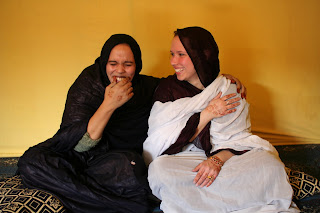The 27th of February 1976 The Polasario Front proclaimed the Saharawi Arab Democratic Republic. We are lucky enough to be able to participate in the celebration, which will take place in Tifariti in the liberated areas.
On the Sahara Press Service, the press agency of the Saharawi Republic one can find the following information:
SADR celebrates 35th anniversary in liberated territories
Shaheed El Hafed (Refugee Camps), February 24, 2011 (SPS) - The town of Tifariti, a symbol of resistance against the occupier, prepares to host Sunday the festivities marking the 35th anniversary of the proclamation of the Saharawi Arab Democratic Republic (SADR) in the liberated territories.
"By commemorating these festivities in Tifariti, we demonstrate more clearly that the Saharawi Republic exercises its sovereignty over the liberated parts of its national territory," organizers indicated.
The commemoration of the 35th anniversary of SADR counts on the presence of several official delegations to show their support for the decolonization of Western Sahara, occupied militarily since 1975 by the Kingdom of Morocco.
Moreover, the Wilayas organize Tuesday popular, cultural and sports festivities on this occasion, in the presence of "friends of the Saharawi people" from the five continents.
On the sidelines of the SADR anniversary, hundreds of athletes, from many countries, are expected Monday in the Wilaya of El Aaiun to take part in the "Sahara Marathon" in its 11th edition along with Sahrawi athletes.
(http://www.spsrasd.info/en/detail.php?id=16583)
In other words, it is very exciting times for Saharawis, Norwegians and around 300 other foreigners alike. We will be going to Tifariti by car, and are planning on staying for two days. We hope to see both military parades, the disarming of mines (which there are a lot of around the “wall of shame” which divides the occupied and the liberated areas – see http://en.wikipedia.org/wiki/Moroccan_Wall for more info), and whatever else the celebrations will consist of.









